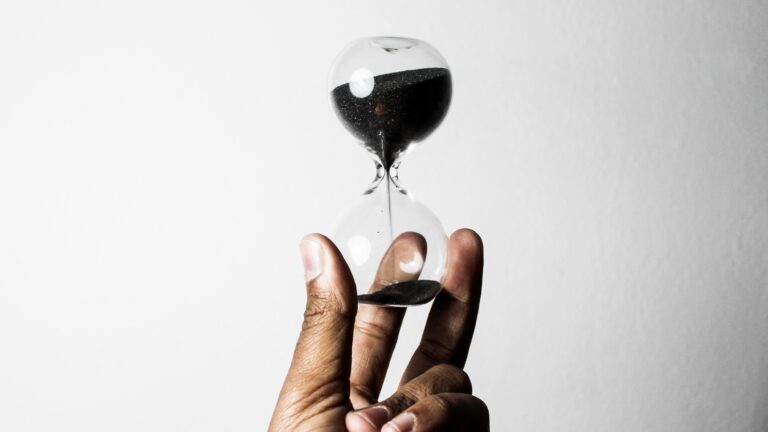The Feeling of Time: Why Some Of Us Feel It Moving Quickly And Others Slowly
How we experience time is a complex and fascinating topic. Depending on our perspective, time can feel like it is moving either quickly or slowly. But what determines our perception of time? And why do some of us feel like time is moving faster than others?
Let us explore the science behind our perception of time. We will discuss the different factors that can influence how we experience time. We will also look at how our understanding of time has changed over the centuries, and how it may continue to change in the future.
Time is a complex topic that philosophers, scientists, and artists have studied for centuries. Our perception of time is constantly changing,
How we experience time is a matter of perspective
Our perception of time is based on several factors, including our age, health, environment, and emotions. Depending on these factors, time can feel like it is moving either quickly or slowly.
For example, time often feels like it is moving more quickly when we are younger. As we get older, we become more aware of the passing of time and how it affects our lives. This can make time feel like it is moving more slowly.
Our health can also affect our perception of time. When we are ill or tired, time can feel like it is dragging. This is because our bodies are working harder to heal or recover, and this takes up more of our attention.
The surrounding environment can also influence how we experience time. If we are in a stimulating environment, such as a party or a new city, time flies by. This is because we are taking in so many unfamiliar sights and sounds that our brain is working overtime to process everything. Conversely, if we are in a monotonous environment, time can seem to drag.
Finally, our emotions can play a role in how we perceive time. If we are happy or excited, time seems to move more quickly. This is because we are enjoying ourselves and not paying as much attention to the clock. If we are sad or anxious, time can feel like it is moving more slowly. This is because we are focused on our negative emotions and not on the passing of time.
Why some of us feel time is moving quickly
There are a few different reasons some of us feel like time is moving more quickly than others.
First, as we mentioned before, our age can influence our perception of time. When we are younger, we have more novel experiences and are less able to predict the future. This makes time feel like it is moving more quickly.
Second, our individual personalities can also play a role in how we experience time. Some people are simply more aware of passing time than others. They may be more sensitive to changes in their environment or have a stronger sense of how time is affecting their lives. This can make time feel like it is moving more quickly for them.
Third, our lifestyles can also affect how we experience time. People who are always on the go or have a lot of responsibilities often find that time seems to move more quickly for them. This is because they are constantly juggling different tasks and don’t relax and reflect on passaging time.
Fourth, certain medications or drugs can also make time seem to move more quickly. Stimulants like caffeine and nicotine speed up our heart rate and make us more alert. This can make time seem like it is moving faster than usual.
Finally, some medical conditions can also cause people to perceive time differently. For example, people with anxiety disorders often find that time seems to move more quickly than usual. This is because they are constantly feeling on edge and their minds are racing with thoughts about the future.
Why others feel time is moving slowly
There are also a few reasons some people may feel like time is moving more slowly than usual.
Our perception of time slows down when we are stressed or anxious. This is because our bodies release stress hormones that make us more alert and increase our heart rate. This slows down our processing speed and makes us pay more attention to the passing of time, also feels slower when we are bored or not engaged in what we are doing. When we are not stimulating our brains with new information, time seems to drag on.
Certain medical conditions can also cause people to perceive time differently. For example, people with PTSD often find that time seems to move more slowly than usual. This is because they relive their traumatic experiences repeatedly, which makes time feel like it is standing still.
The science behind how we experience Time
There are two fundamental theories that try to explain how we experience time.
The first theory, known as Prospect Theory, suggests that our perception of time is based on our experiences. If we have had positive experiences in the past, then we expect good things to happen in the future and time seems to flash by. However, if we have had negative experiences in the past, then we expect bad things to happen in the future and time seems to linger.
The second theory, known as Duration Discrimination Theory, suggests that our perception of time is based on how much information we take in during a period. If we take in a lot of information, then time is in a hurry. However, if we take in little information, then time seems to move at a crawl.
Both theories try to explain how our individual perspectives on time can change. Prospect Theory suggests that our perception of time varies depending on our experiences, while Duration Discrimination Theory suggests that it varies depending on how much information we take in during a period.
How our individual perspectives on Time can change
As we have seen, there are several factors that can influence how we experience time. Our age, health, environment, and emotions all play a role in determining whether time feels like it is moving quickly or slowly. Our individual personalities, lifestyle choices, and medications can also affect our perception of time.
It is important to remember that our perspective on time is always changing. As our circumstances change, so does our perception of time. For example, when we are younger. Time often feels like it is moving more quickly because we have less responsibility and more novel experiences. However, as we get older and take on more responsibility. Time may feel like it is moving more slowly. Similarly, if we take medication for anxiety or depression, then our perception of time may change as well.
What this means for how we live our lives
Understanding how we experience Time is important for several reasons. First, it can help us understand why we feel the way we do about certain situations. If We Know why we are feeling anxious or Stressed about an upcoming deadline at work, then We Can Take Steps to manage those feelings better. Second, it can help us understand how best to use our limited time. If we know, we procrastinate when there is lots of free time available.
Enjoy your time while you have it.

